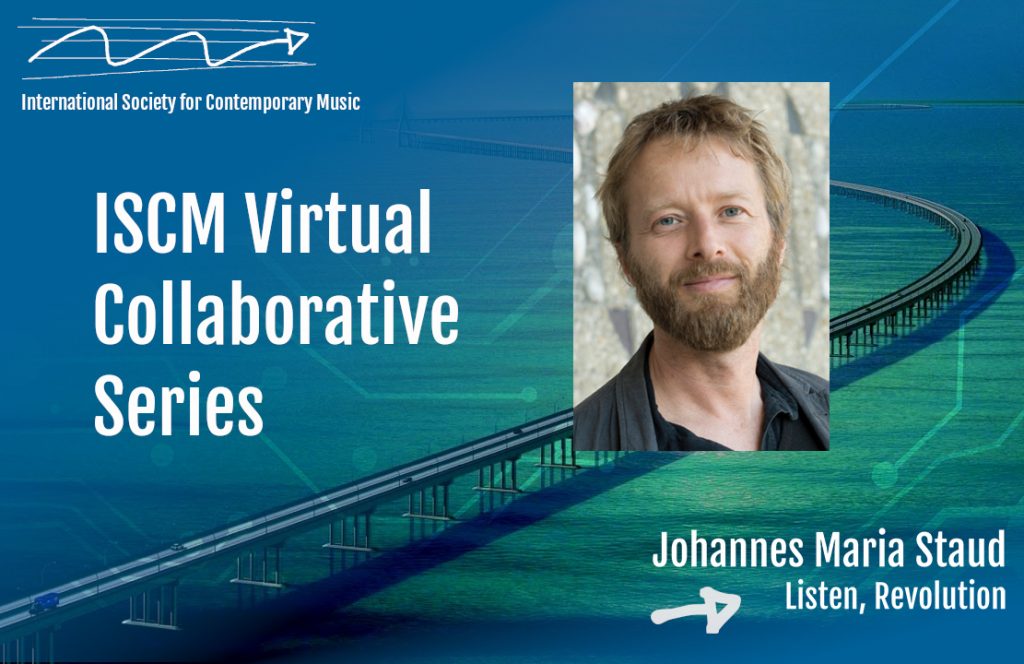Johannes Maria Staud: Listen, Revolution

Johannes Maria Staud (b. 1974 in Innsbruck) draws much of his inspiration from literature and the visual arts. Reflections on philosophical questions, social processes, and political events also influence his compositions. His artfully constructed works possess a rigorous dramaturgy. Staud studied musicology and philosophy in Vienna before continuing his compositional studies with Hanspeter Kyburz in Berlin. In 2002, just one year after graduating, he won the Erste Bank Composition Prize; in 2003 he received the International Rostrum of Composers prize, followed by the Ernst von Siemens Composers’ Prize in 2004 and the Schleswig-Holstein Musik Festival’s Paul-Hindemith-Prize in 2009. Prestigious commissions followed. In 2004/05 Apeiron was commissioned by the Berlin Philharmonic under Sir Simon Rattle. In 2006 Segue for violoncello and orchestra was commissioned by Heinrich Schiff and the Vienna Philharmonic under Daniel Barenboim for the Salzburg Festival.
About his 2021 chamber orchestra composition Listen, Revolution, co-commissioned by the ensemble XXI. jahrhundert, Ensemble Modern and Wien Modern, Staud has written: The title of my work is taken from the poem “Good Morning, Revolution” (1932) by Langston Hughes, an important representative of the African American art movement Harlem Renaissance. Hughes’ work, which combines the struggle against discrimination and structural racism with aesthetic renewal and linguistic idiosyncrasy – political poetry, committed literature that has lost none of its relevance – inspires me right now in manifold ways and on several levels. Political consciousness and aesthetic revolution; aesthetic consciousness and political revolution: how are these things related at all? Do they depend on each other, or do they sometimes contradict each other? How can I artistically and convincingly process my rage, my lack of understanding of the real political conditions and the currently rampant inflammatory demagogies? Can music without text be political at all? And: does it have aesthetic added value if it is? What is revolution in music at all – something completely different from politics or its mirror? How does it appear? Noisily and ostentatiously, almost triumphantly with aplomb, or quietly, almost inconspicuously, through the back door, as it were? Is it even a chameleon, a devious chimera that can also take on the face of counter-revolution? Can revolution in art be equated with progress at all? Questions upon questions…
My work is cast for a 17-piece ensemble and consists of several short parts that grow linearly in duration and focus on a wide variety of instrumental combinations as well as diverse, multi-layered, polyphonic, pulsating and suction-like tutti sections. The formal tension is ignited between the small-scale sections, which become increasingly complex in their self-similar internal structure with increasing duration. They are always unstable mixtures of clearly defined gestures that constantly influence each other and are capable of changing their identities as the piece progresses. These mixtures are capable of unexpectedly “tipping over” at any time, igniting and “instigating” revolutions that radically and permanently change the musical environment.
performed by Ensemble XXI under the direction of Peter Burwik
World Premiere Performance
November 2021 during Wien Modern at the Mozart Hall of the Wiener Konzerthaus
